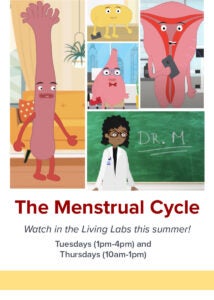 The Mahalingaiah Lab, or M-Lab, at the Harvard School of Public Health and Boston’s Museum of Science, were awarded $40,000 from the NIEHS center at Harvard T.H. Chan School of Public Health to develop an exhibit about the menstrual cycle. The grant brought together the expertise of scientists, educators, and artists who worked together to create a fun animation about menstrual cycle anatomy and physiology. The goal of the animation is to educate children and families about the menstrual cycle in a manner that is accurate, accessible, and inclusive. It is designed to provide children with a gentle and engaging introduction to periods and puberty. And for caregivers, who play a formative role in children’s understanding of and attitude toward puberty, it serves as an educational tool they can rely on as they navigate these conversations. The initiative is encouraging caregivers to have timely conversations with youth, hoping to pique interest amongst both children and adults to learn more, and striving to diminish the stigma that still exists around menstruation.
The Mahalingaiah Lab, or M-Lab, at the Harvard School of Public Health and Boston’s Museum of Science, were awarded $40,000 from the NIEHS center at Harvard T.H. Chan School of Public Health to develop an exhibit about the menstrual cycle. The grant brought together the expertise of scientists, educators, and artists who worked together to create a fun animation about menstrual cycle anatomy and physiology. The goal of the animation is to educate children and families about the menstrual cycle in a manner that is accurate, accessible, and inclusive. It is designed to provide children with a gentle and engaging introduction to periods and puberty. And for caregivers, who play a formative role in children’s understanding of and attitude toward puberty, it serves as an educational tool they can rely on as they navigate these conversations. The initiative is encouraging caregivers to have timely conversations with youth, hoping to pique interest amongst both children and adults to learn more, and striving to diminish the stigma that still exists around menstruation.
The project principal investigator is Shruthi Mahalingaiah, Assistant Professor of Environmental, Reproductive, and Women’s Health, who is well-known for her work in reproductive health and education. Her colleagues in this endeavor are Susan Heilman the program manager at the Museum of Science. The animator was Anthony DeNitto, a recent Visual Arts graduate of Harvard College. Tatheer Adnan is the project lead who is another recent graduate of Harvard College, and Leena Gupta the Research Assistant who is a Co-Op student from Northeastern University.
In the 6-minute animation, anthropomorphized organs relevant to the menstrual cycle make the video lighter and easier to understand for younger children. The characters are the pituitary gland, ovaries, uterus, and fallopian tubes while the egg is presented as an inanimate object. Caregivers and children have both enjoyed the character-like representations of organs which reinforced the roles they play in the human body and contributed to normalizing the labeling of bodily organs and processes.
The M-Lab is excited about showing our commitment to women’s reproductive health and the environment to optimize the dissemination of knowledge. This study is the first milestone in what will be a long, rich collaboration to create, curate, and convey content that is increasingly relevant in our society today.
For more information please visit our website at: https://mahalab-mos.com/
